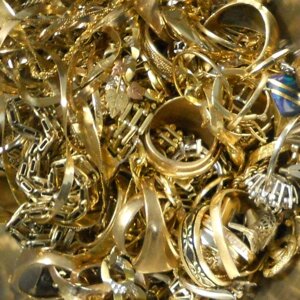Recycling Platinum Lab Crucibles: A Deep Dive into What You Need to Know
We’ve written in the past about recycling platinum laboratory equipment. Back in 2014, for example, we published a post entitled, “Bright Shiny Platinum Could Be Hiding in your Dented and Dirty Old Labware.”
Let’s fast forward to 2023. In the video that accompanies today’s blog post, we interview Dan Fried, President and Founder of Specialty Metals Smelters and Refiners, about making money recycling platinum and iridium crucibles.
Make These Items with High Precious Metal Scrap Value Your Top Collecting Priority
A number of factors make certain kinds of precious metal scrap more desirable investments than others.
These factors include the density and distribution of precious metal within the scrap. If one ounce of gold is distributed through two pounds of scrap, for example, that is a desirably, high density form of scrap. If that same single ounce of gold is distributed through two tons of dirt or sand, that makes for a less desirable investment. (It is easier to ship and process two pounds of material than it is to ship and process two tons.)
A Surefire Plan to Make a Lot of Money by Investing in Precious Metals
Many precious metal investors believe that they will make a lot of money if they look for “one big win” in their investing. They will find one batch of gold scrap, platinum scrap or even silver scrap, make a lot of money from it, and then they will be set for life.
Of course, that does happen. (We could tell you stories about times when it has.) But looking for one big high-paying batch of metal is not the most effective way to spend years investing and ending up with a large sum of money from investments.
The $1,000 Platinum Lab Crucible that Wasn’t
For a couple in New Jersey, it was time to clean out the basement. A corrugated cardboard box they pulled off a shelf contained some interesting metal items they had inherited, but never really examined. They found a small silver-plated candle holder and a sterling silver lid that had probably once been paired with a candy dish or some other bowl.
What Are the Most Profitable Items to Scrap?
A caller to our office asks, “What are the most profitable items to scrap?”
That is a very intelligent question because when you stop to analyze it, you see that it contains several other questions that are also very smart to ask:
Precious Metals: What to Look for When You’re Cleaning Out a Medical Facility
Whether you’re clearing out or cleaning up a hospital, a nursing home, a testing lab or a medical facility of a different kind, you have good opportunities to cash in on precious metals.
Medical facilities are home to many kinds of supplies and equipment that contain gold, silver, platinum and even cadmium.
How Hospital Administrators Can Become Recycling Stars
If you are an administrator at a hospital, chances are good that you have an unusual opportunity . . .
You can turn unused supplies and equipment into a significant source of income
Are you taking advantage of the opportunity to recycle all the unused precious metals that can be found in your facilities? If not, let’s find out how.
Can You Recycle Precious Metals from Medicines and Medical Devices?
Please take a minute to consider this imaginary story… You buy an old retail building that was once home to several stores. One of them was a pharmacy. While you’re exploring there, you open a drawer and find several dozen boxes of old wound dressings that contain silver. You then send those wound dressing to a precious metals refinery like us, we process them, and send you a nice big check for several hundred dollars. It's a nice fantasy, isn’t it? But if you find any, they are not going to contain enough silver to be worth much. Sorry to deflate your dreams of wealth. But let’s look at some other places where silver and other precious metals can be found in the world of medicine.
Hunting for Platinum? These Three Facts Can Help You Find More
Have you ever failed to realize that an old ring, an old lab vessel, or a bit of white metal scrap was made of platinum? If you have, you are not alone. Because platinum is a white metal, it is easy to mistake it for silver or even something as low-end as polished pewter, stainless steel or even aluminum. Here are three facts that can help you recognize platinum more quickly and reliably.
Looking to Recycle Platinum? What Is the Most Profitable Source?
Catalytic converters are probably the biggest source of recyclable platinum today, because so many of them have been manufactured – and so many are piling up in scrapyards and other places where cars are repaired or scrapped. But even though cat convertors might be the biggest source of platinum, are they the best source for speculators who like to collect platinum scrap and send it to us to be refined? Not necessarily.
Why Stuff that Doesn’t Glitter Could Be Platinum
Although platinum doesn’t rust or oxidize, it can discolor after it is exposed to high heat in laboratories. That bluish patina can be deceiving. You look at a discolored piece of thermocouple wire or a testing crucible or a stand that was used in the lab and think, “this discolored stuff can’t possibly be platinum.” The discolorations that affect used platinum mesh or sponge can be even more deceiving. They can be reduced to a blackish powder that you’d be tempted to sweep up and toss away.
A Brief History of Platinum
Because platinum wasn’t used widely in jewelry or industry until about 100 years ago, it seems like a “new” precious metal. That’s not really true. In about 700 B.C., Egyptian artisans were using it to make ornamental objects, like the famous and mysterious Casket of Thebes. And at the same time, pre-Columbian artisans in South America were fashioning it into small trinkets. Those are only a few fascinating facts about this beautiful, tarnish-resistant, and durable precious metal. Here’s a quick timeline of its fascinating history.











